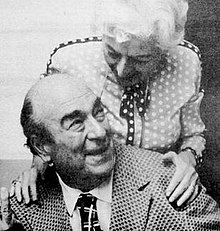Mort Weisinger
| Mort Weisinger | |
|---|---|

Weisinger and DC Comics proofreader Gerda Gattel in 1975.
|
|
| Born | Mortimer Weisinger April 25, 1915 New York City, New York |
| Died | May 7, 1978 (aged 63) Great Neck, New York |
| Nationality | American |
| Area(s) | Writer, Editor |
|
Notable works
|
Action Comics Superman |
| Awards |
Inkpot Award, 1978 Eisner Award Hall of Fame, 2010 |
Mortimer "Mort" Weisinger (April 25, 1915 – May 7, 1978) was an American magazine and comic book editor best known for editing DC Comics' Superman during the mid-1950s to 1960s, in the Silver Age of comic books. He also co-created such features as Aquaman, Green Arrow, and Johnny Quick, served as story editor for the Adventures of Superman television series, and compiled the often-revised paperback 1001 Valuable Things You Can Get Free.
Weisinger was born in the Washington Heights section of New York City, New York and raised in the Bronx, as the son of Austrian Jewish parents. His father was a businessman in the garment trade. At 13, he was introduced to science fiction by means of a borrowed copy of the August 1928 issue of Amazing Stories (featuring Buck Rogers and The Skylark of Space). By 1930, Weisinger was active in some of the earliest SF fan clubs and fanzines, including The Planet. In 1931, Weisinger hosted a meeting of pioneer SF fan club "The Scienceers," which was attended by a young Julius Schwartz, who recalled that the two became "very friendly... [and] got along well together." A year later, Weisinger, Schwartz and Allen Glasser joined fellow-future professional editor Forrest J. Ackerman in founding The Time Traveller, which they styled "Science Fiction's Only Fan Magazine". The claim was more than mere youthful bravado, according to SF historian Sam Moskowitz, who described the 'zine as the first devoted entirely to science fiction. Drawing on information they had gleaned from writing letters to the SF magazines and authors of the day, the young fans published interviews with, and short pieces by, established SF writers, and in the process gained increasing familiarity with the personalities and situations of the genre in that era. The first issue featured "a one-page biography of Edward 'Doc' Smith... [and] some news items."
...
Wikipedia
